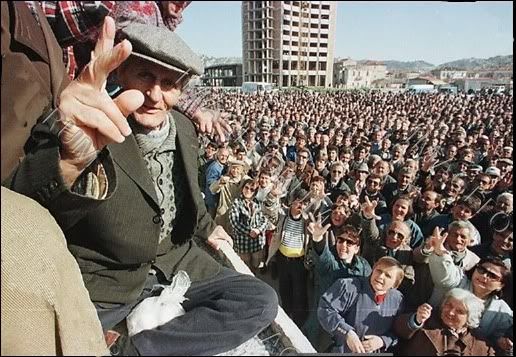After 20 years of Civil War in Albania, forgotten are about 5 thousand killed, and this period, neither mentioned in the history books, actually in Albania.
Greek PM Simitis, said NO, to the US project............

SManalysis
It happened 19 years ago, on March 14, 1997, in the hall of, the Italian frigate, "Aliseo" between top diplomats of the OSCE, and 15 representatives of armed groups in Southern Albania.
It happened 19 years ago, on March 14, 1997, in the hall of, the Italian frigate, "Aliseo" between top diplomats of the OSCE, and 15 representatives of armed groups in Southern Albania.
The Enigma of the Civil War after collapse of Pyramidal Scenes of Albania in 1997, between USA and Greece, a secret pact, which Simitis, Papoulias and Pangalos did not accepted.

In 1997, after the demolition of the pyramid schemes, in Albania, the Civil War broke out, within 6 months to set order, was killed about 3800 people. Country risked traditional division between the North, the Gheges, and the South, Tosko Epirotan.
Encyclopedia Wikipedia, has made a brief description of the Civil War in Albania, forces that clash with government authorities, Which controlled only half of the territory of Albania.
It happened 20 years ago, in the hall of, the Italian frigate, "Aliseo" between top diplomats of the OSCE, and representatives of armed groups in Sothern Albania.
Representatives of OSCE were Wraniski Austrian former Chancellor of Austria, Chairman, members from Italy, Germany, France and Greece.
In March 11, 1997, CNN gives Albania map divided into Shkumin River.


(Stavri Marko BBC Radio Correspondent)
Greek PM Simitis, said Νο, to the US project............
"I was the only journalist in the meeting, for the BBC, inside the delegation of 15 people of the Committee of Public Salvation of the Southern Albania., But I have memories of meeting in the Italian Frigate "Aliseo" in Adriatic Sea, late evening on 14 March 1997 that the OSCE, demanded to know the final decision of heads of groups in Southern Albania, to surrender weapons, if the president Sali Berisha will resign.
Although rebel groups the answer was NO, the representatives of Greece and Italy, were most interested to know how they will be managed crisis.

But in particular the Special Invited of Athens, Yiannos Kranidiotis, Greek deputy Foreign Minister "expressed concern me personally, that the Greek government,," is withdrawing from a plan of US" . Simitis, Papoulias, Tzoxatzopoulos, and Pangalos, have not ever explain what they plan proposed by USA, should be not agreed, for acting in practice.
The
Greek opinion does not know still why the Greek government, have not ever explain what
they plan proposed
by USA (if
it is true)
do not agreed, for
acting.
What still hide, Simitis, Papoulias,
and Pangalos, to
show one of the most contentious
issues of the 20th century, on
National Issues of
Greece?
Anyway, we remember critical condition dated on March 11, 1997, when CNN declared Albania divided by Civil War".
Anyway, we remember critical condition dated on March 11, 1997, when CNN declared Albania divided by Civil War".
Albanian troubles expose north-south differences

March 11, 1997
Web posted at: 9:45 p.m. EST (0245 GMT)
Web posted at: 9:45 p.m. EST (0245 GMT)
From Correspondent Siobhan Darrow
VLORA, Albania (CNN) -- The people
of Vlora, the southern stronghold of Albania's rebellion, are trying to put
their revolt in order, inviting local police officers loyal to their cause to
help reign in the chaos.
The rebels, who have named
themselves the Salvation Committee, say they won't surrender to this government
or any other until their demands are met.
"We'll only find a solution to
this problem when the main issue, which is financial, is solved," said
Alberto Bukir, head of the Salvation Committee in Vlora. "All political
solutions are a bluff."
Government troops have dug in north of the Shkumbin River,
pulling back to the historic fault line dividing this river country's two major
ethnic groups: the Ghegs in the north and the Tosks in the south.
Their differences threaten to split
the country in two, although neither group says it wants to fight the other.
Just across the Adriatic from Italy,
Vlora has always been more open to the outside than the more insular north.
When communism collapsed, not all those influences were good. Drug trafficking
and smuggling flourished in the town, and it became known as Albania's crime
capital.
Impatient to live the lives they now
see via satellite television, the wealthier Tosks were easy prey for
get-rich-quick pyramid schemes. They had more to lose when those schemes
collapsed.
And the man they blame, President
Sali Berisha, is a Gheg from the north.
"The Tosks provided the leaders
of the Communist Party, and the Ghegs felt they lost out in the competition for
power," political analyst Mark Almond said.
That gap was something Berisha quickly made up for when he
came to office, filling security ministries and the parliament forces with his
northern brethren, and fueling distrust in the south.
To an outsider, the whole country
may look lost in a time warp. But to the cosmopolitan Tosks in the south, the
north is a backwater. The Ghegs are mountain people still deeply rooted to
their traditions; they are more isolated and less sophisticated than their
southern neighbors.
But like the Tosks, the Ghegs say they don't want the
current civil strife to turn into a fight between the two groups.
"We haven't fought in the
past," said one middle-aged man. "We have been united and must stay
that way. There are too few of us Albanians."
Albania's Tosks and Ghegs have lived
in relative harmony for centuries. But with the country now practically split
in half, their differences could be exploited by parties uninterested in peace.
No comments:
Post a Comment